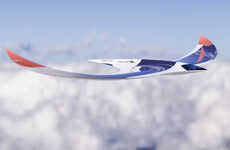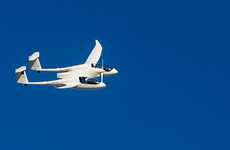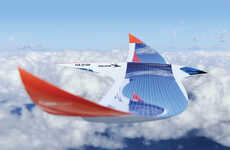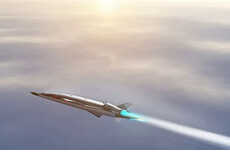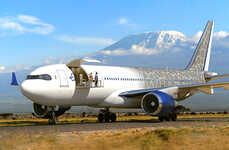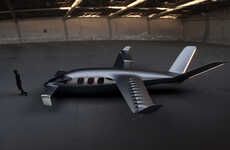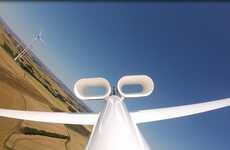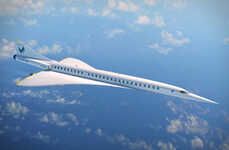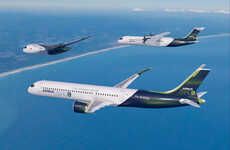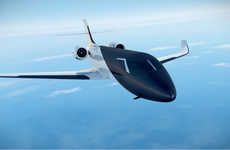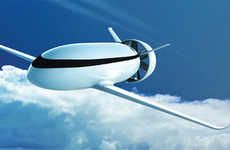
The Lockheed Stratoliner is Fiercely Futuristic and Green
Michael Hines — September 21, 2011 — Autos
References: lockheedmartin & yankodesign
The Lockheed Stratoliner is a conceptual commercial jet developed by William Brown for Lockheed Martin, a company perhaps most famous for its military contracting.
Lockheed Martin is experienced in designing aircraft features meant for warfare, but commercial aircraft designs are a new realm for the company. Despite their relative inexperience, the Stratoliner is a winning design featuring futuristic styling and an innovative propulsion system.
The Lockheed Stratoliner is powered by four Cryogenic Hydrogen Turbofan engines. The engines allow the aircraft to cruise around the world emitting no emissions whatsoever. Taking from their military experience, the designers gave the Stratoliner's engines the ability to go into a low-power state (similar to what a fighter jet's engines can do), to save fuel while flying at a slower cruising speed.
The aircraft's engines are all well and good, but it's the design that truly takes the cake. The Lockheed Stratoliner is like no other aircraft out there with its reptilian nose and long, loping wings. The world may not be quite ready for this design, but at least this gives a glimpse of aircraft construction for the future.
Lockheed Martin is experienced in designing aircraft features meant for warfare, but commercial aircraft designs are a new realm for the company. Despite their relative inexperience, the Stratoliner is a winning design featuring futuristic styling and an innovative propulsion system.
The Lockheed Stratoliner is powered by four Cryogenic Hydrogen Turbofan engines. The engines allow the aircraft to cruise around the world emitting no emissions whatsoever. Taking from their military experience, the designers gave the Stratoliner's engines the ability to go into a low-power state (similar to what a fighter jet's engines can do), to save fuel while flying at a slower cruising speed.
The aircraft's engines are all well and good, but it's the design that truly takes the cake. The Lockheed Stratoliner is like no other aircraft out there with its reptilian nose and long, loping wings. The world may not be quite ready for this design, but at least this gives a glimpse of aircraft construction for the future.
Trend Themes
1. Futuristic Aircraft Design - Designing commercial aircrafts with futuristic styling presents disruptive innovation opportunities in the aerospace industry.
2. Eco-friendly Propulsion Systems - Developing aircraft propulsion systems that emit no emissions and have low-power capabilities opens up disruptive innovation opportunities in the aviation sector.
3. Crossover From Military to Commercial - Transferring military aircraft design expertise to the commercial sector creates disruptive innovation opportunities in the aerospace industry.
Industry Implications
1. Aerospace - The aerospace industry can benefit from adopting futuristic aircraft design and eco-friendly propulsion systems.
2. Aviation - The aviation industry can explore innovative propulsion systems and unconventional aircraft designs inspired by military expertise.
3. Aircraft Manufacturing - Bringing military aircraft design knowledge into the commercial aircraft manufacturing industry can lead to disruptive innovations in aircraft construction.
6.1
Score
Popularity
Activity
Freshness


